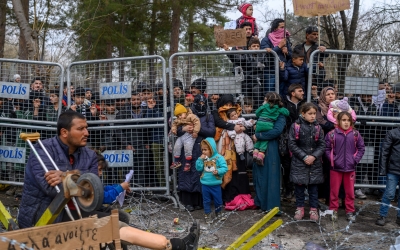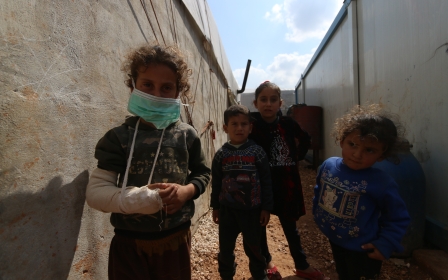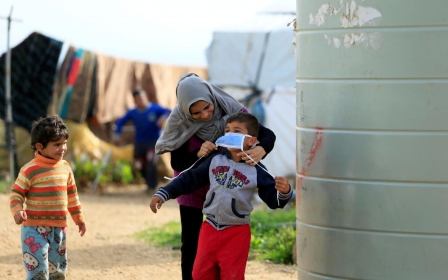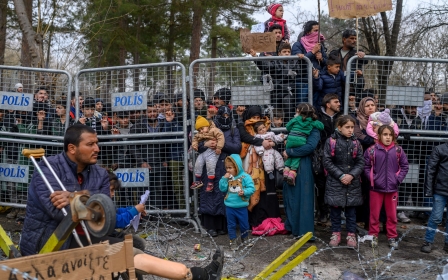Rule of the ribers: Inside one of Turkey's largest people-smuggling rings
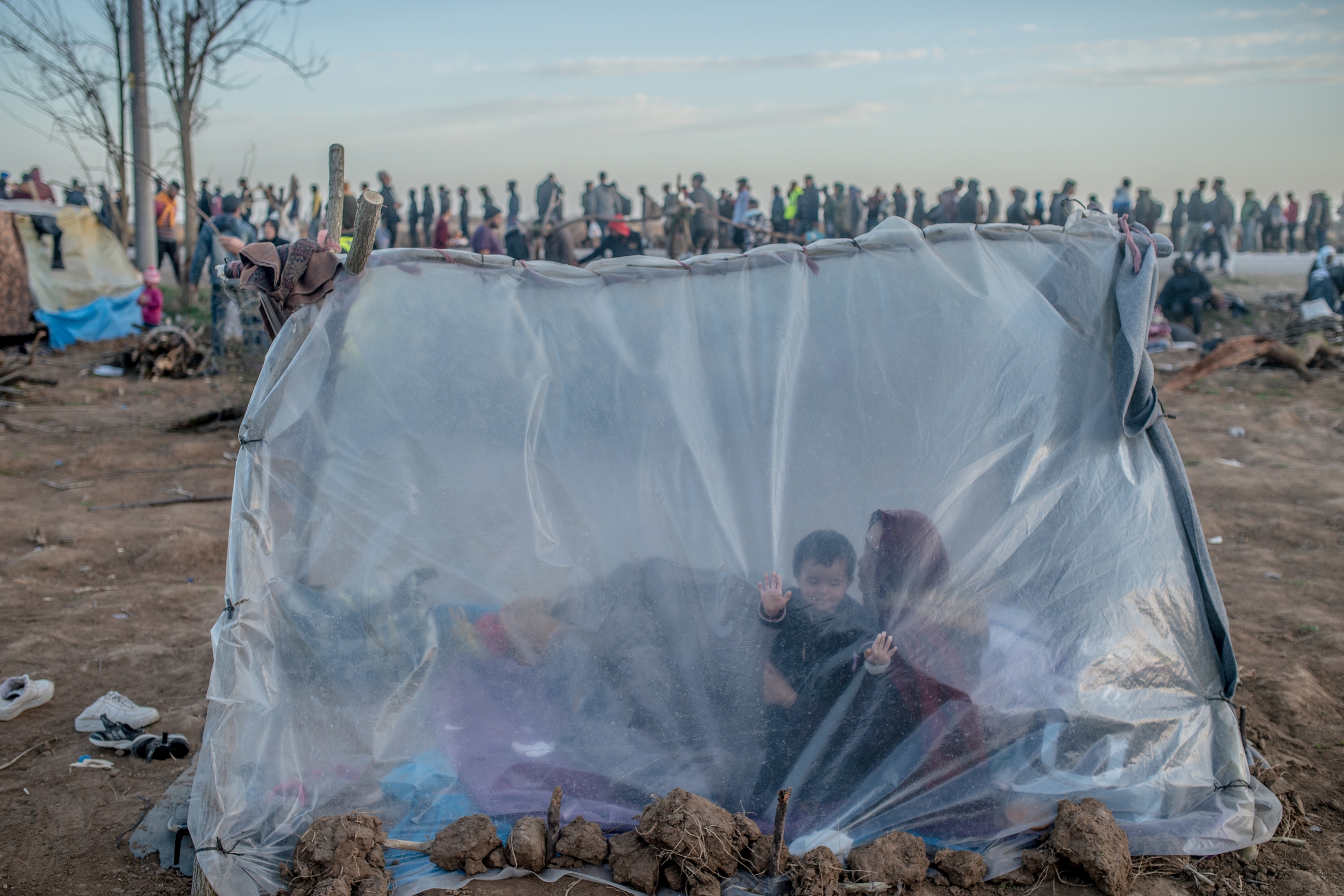
On one phone, a man tracks the road using a map application. On another, he is receiving instructions from a group of scouts to bypass police barriers on his route in Istanbul.
Such is the way that Al-Sultan, the leader of one of the largest people-smuggling mafia groups in Turkey, delivers refugees to their first step towards Greece.
Despite the dangerous reputation his smuggling ring has, Al-Sultan is the main port of call for those who have given up on the United Nations High Commissioner for Refugees (UNHCR), and a last resort for those desperate to obtain legal residency papers in Turkey.
Each smuggler's network consists of about 20 to 30 "ribers" - a Kurdish word that means leader - and in the smuggling world, the riber leads refugees and takes them from one country to another.
Smugglers say they help people who are at risk and transport them to Europe, towards safety, in exchange for money.
New MEE newsletter: Jerusalem Dispatch
Sign up to get the latest insights and analysis on Israel-Palestine, alongside Turkey Unpacked and other MEE newsletters
But as Middle East Eye recently infiltrated the largest smuggling community in Turkey and Greece, it witnessed widespread abuse of power by those who take advantage of desperate people.
Al-Sultan and his men
In Turkey, smuggling services are divided into three categories.
The largest and most expensive category is for the falsification of documents - including passports and identity papers - and the transportation of the refugee or migrant through airports to Europe, in exchange for between 8,000 and 15,000 euros ($8,775 - 16,450).
For a fee of between around $2,200 and $6,600, the second option offers a transportation across the sea towards Greece from meeting points in the provinces of Izmir and Bodrum.
Meanwhile, Al-Sultan earns from $1,000 to more than $3,000 for transporting refugees by road from Istanbul in Turkey to Thessaloniki in Greece.
Aside from two of his brothers who run separate smuggling networks, Al-Sultan is considered the strongest in Istanbul.
Over the years, Turkey has become the gateway for millions of refugees and asylum seekers heading towards Europe, and smugglers have become an alternative to embassies and consulates of European countries, which take a long time to process asylum applications.
Al-Sultan, who himself fled Syria with his family in 2011, established his own smuggling network after a stint as a riber led to his arrest multiple times in both Turkey and Greece.
Like Al-Sultan, ribers hide their real names and speak on condition of anonymity.
One told MEE that he earns 100 euros ($110) for each day he works at the Turkish-Greek border.
"When I left Idlib for Turkey, I could not find any work. I will save up some money here and then leave this dirty work," a second riber said.
But another said that the money they amass will be of no good in the event of their arrest, as people smugglers are severely punished in Turkey and Greece.
Attracting refugees
Al-Sultan owns a network of brokers on the ground and on social media to attract refugees. After contact is made, the brokers meet with them at a popular cafe in central Istanbul's Fatih area - sometimes referred to as "Little Syria" - where the transit costs and the method of payment are agreed upon.
The money is received in cash or placed with a third party, usually a money insurance office that hands over the currency to the smuggler when the refugee reaches his or her destination.
I will save up some money here and then leave this dirty work
- Anonymous smuggler
Despite the official veneer, the offices are in fact secretly linked to the smugglers, and take a percentage of the fee, relative to the amount paid by the asylum seekers.
The share of the broker, meanwhile, is 100 euros for each refugee, MEE has learned.
After the deal is agreed, the refugees are then distributed between four apartments in the Canaria area, where most of Al-Sultan's ribers reside, and are told that it is only a matter of hours before cars will arrive to transport them to the Greek border.
To avoid raising suspicions, smugglers use luxury cars, some of which are stolen and have been set up with false plates.
Al-Sultan, like other smugglers, uses scouts to check the safety of the roads.
Standard cars roam Istanbul and report back by phone to give instructions on roads, checkpoints, ambushes and police patrols that might be set up to catch smugglers and vehicles carrying refugees.
A family exploited
MEE met with a family who had escaped the escalation of violence in Syria and has been set up in difficult conditions.
For more than a week, the family has been residing in a room in an apartment occupied by ribers who were trying to extort money from them.
"I paid cash to the broker, but Al-Sultan says he has not received the full amount," the head of the family told MEE on condition of anonymity.
The smugglers have threatened them, saying that, if they leave the house, they will lose the money paid and no car will be provided for them.
"If I leave the house, I will definitely lose the money, so I have to wait for the cars to arrive," he said.
The family was also warned to limit its movements in the area where the building is so as to not raise suspicions. Only one member of the family can go out.
Not wishing to leave his wife alone in the apartment, the man would give money to the ribers for necessities, but they took double the price for the products the family needed.
"They take twice the price of infant formula, but I'm afraid to leave my wife alone in the room inside a house where at least 10 ribers are staying," he said.
Meanwhile, another Syrian refugee, who lacks the funds to cross into Greece with her children and lives in the same building as Sultan and his gang, is being subjected to unwanted advances.
"We will get married soon, and we will live in Greece and move to Europe," one riber told her on the phone.
Most of the time, smugglers and their associates operate under the influence of drugs, such as the methampetamine Ice or the amphetamine-based Captagon, which they say help them withstand the long treks through forests towards Greece, often in cold weather and sometimes during storms.
Dirty tricks
"This is a big city, and they can't catch us," said a riber who had just returned with two others from a luxury restaurant, where they had had a meal and then fled without paying the bill.
Two of the ribers enter a room housing young refugees and ask for a phone to guide a new driver to the apartment. From there, the new man will take everyone to the border.
Half an hour later, one of them returns with claims that the police chased them down and arrested the driver and the riber carrying the phone.
Such tricks are often employed by smugglers.
UNHCR did not respond to MEE's questions about the conditions that refugees are enduring in Turkey and on the Turkish-Greek border.
Turkey is home to the world's largest refugee population, hosting some four million refugees, including 3.6 million Syrians, according to UNHCR.
Middle East Eye delivers independent and unrivalled coverage and analysis of the Middle East, North Africa and beyond. To learn more about republishing this content and the associated fees, please fill out this form. More about MEE can be found here.



